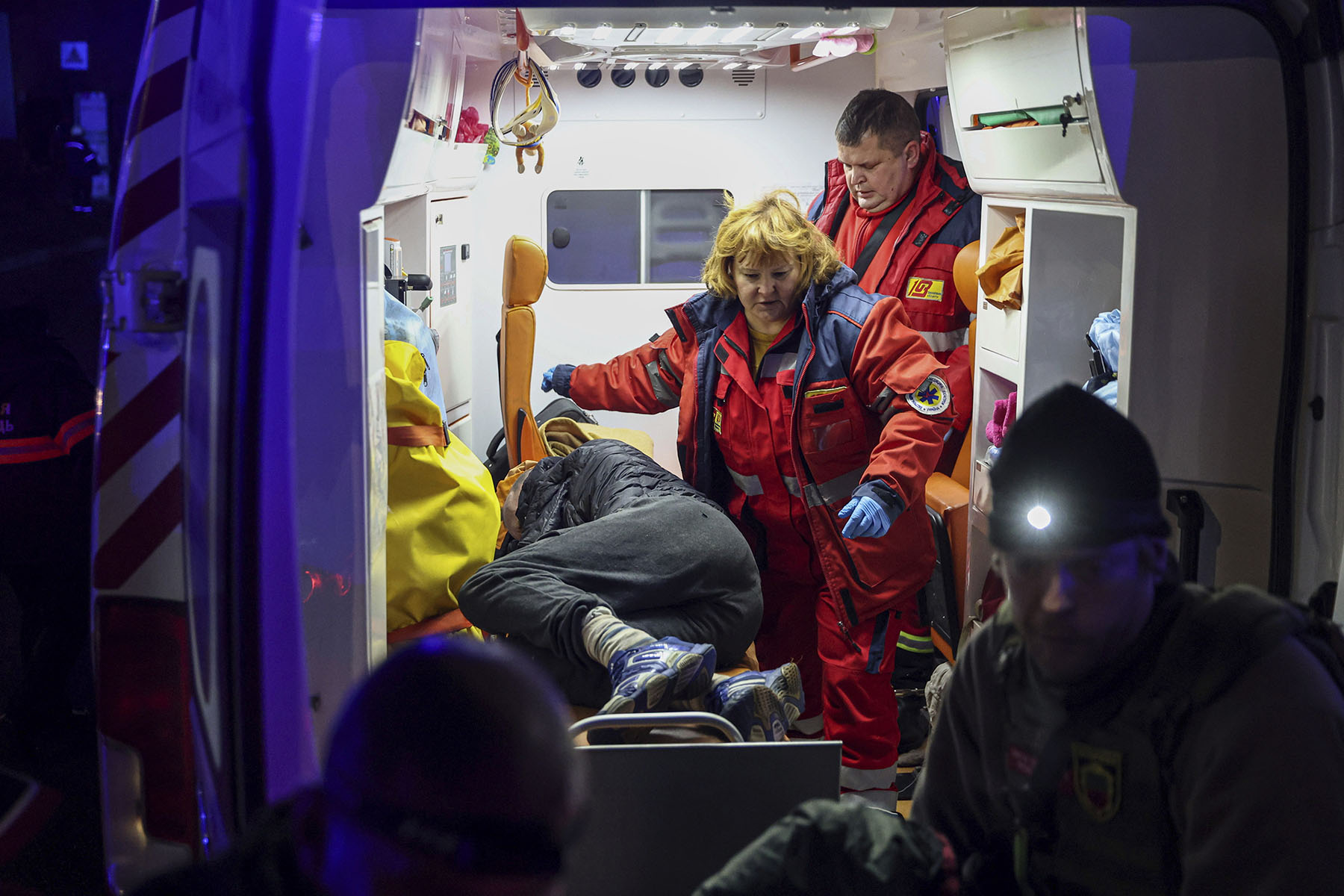From assistance to minerals deal, Washington seeks policy overhaul

Editor's note: As the Russia-Ukraine conflict marks its third anniversary on Monday, this page looks at the current situation as well as the shifting US stance and EU commitments that may affect the conflict's outcome.
The United States' approach to the Russia-Ukraine conflict has dramatically changed with the new administration in Washington.
US President Donald Trump, who started his second term last month, has questioned the multibillion-dollar aid and weapons sent to Ukraine during the Joe Biden administration.
Trump has called for a return of aid money from Kyiv, and demanded that Ukraine provide the US with rare earth minerals in exchange.
A deal for the minerals is estimated to be worth $500 billion, a price tag Ukraine has balked at and which is much higher than published US aid figures. Despite growing pressure from the US side, Ukrainian President Volodymyr Zelensky is "not ready" to sign a minerals deal with the US, Agence France-Presse reported, citing a source. But Trump said on Saturday the US is "close" to an agreement on sharing revenue from Ukrainian minerals.
READ MORE: Trump, Zelensky trade barbs over Russia-Ukraine conflict
Zelensky and European Union representatives were not invited for preliminary talks between the US and Russia on Feb 18.
The talks to settle the three-year conflict between Russia and Ukraine — which started on Feb 24, 2022 — were led by US Secretary of State Marco Rubio and Russian Foreign Minister Sergey Lavrov as they met in Saudi Arabia's capital Riyadh on Tuesday.
The discussions were a prelude to an expected meeting between Trump and Russian President Vladimir Putin later this month.
Jack Midgley, principal of the global consultancy Midgley & Co, told China Daily that the conflict's outcome rests with Russia and the US.
"If the United States and Russia reach an agreement, the Ukrainians have to come along," Midgley said.
"If you look at the actual assistance that's gone into the war, the Americans have put in about $114 billion. The next biggest contributions are from Germany and the UK, and those are at about 10 percent of what the Americans have put in," he said.
The figures on the number of casualties in the conflict vary widely. According to figures released by Kyiv, United Nations statistics, and open-source data published by BBC Russia, the death toll of Ukrainian and Russian soldiers, and Ukrainian civilians stood at 148,359 as of Feb 13.
On Feb 16, Zelensky said more than 46,000 Ukrainian soldiers had been killed, and in a Feb 4 interview with journalist Piers Morgan, he said 390,000 Ukrainian soldiers were injured.
Midgley said: "There are some areas where the Americans and the Russians agree or have a common interest."
The first one is excluding Ukraine from NATO, he said. "The Americans don't want Ukrainians in NATO as it would mean providing a nuclear guarantee to Ukraine, which is not in America's interest. And the Russians don't want Ukraine in NATO either, as it means there will be American, British and German troops stationed in Ukraine."

He said the second sticking point is EU membership for Ukraine. "If you put Ukraine in the EU, it is the poorest country in Europe. They will require huge economic assistance."
"There's a third area … safety of the Chernobyl nuclear plant (in northern Ukraine). The Chernobyl plant … is an environmental disaster. And it needs huge investment to keep it safe," he said.
Sourabh Gupta, a senior fellow at the Institute for China-America Studies in Washington, DC, told China Daily that "while NATO will continue to be the premier Western defense body in the Euro-Atlantic space, a nucleus of autonomous Western and Central European defense — and defense industrial base — capability will also coalesce in the years ahead".
The Pew Research poll published on Feb 14 found that 37 percent of US citizens felt the country was doing too much to help Ukraine, 31 percent said it was doing the right amount, with 30 percent saying it's not enough.
There was a partisan divide in the US. Republicans and Republican-leaning independents are far more likely than Democrats and their supporters to say the US is giving Ukraine too much support.
Gallup has conducted polls on the conflict six times since August 2022. For the first time, it saw 48 percent support (as of December) for the US in helping Ukraine reclaim its territory, slipping below the majority mark.
Ukrainian officials were not part of the Riyadh talks, and Zelensky has said Kyiv will not accept the results of negotiations that do not involve Ukraine.
On Feb 19, Trump called Zelensky a "dictator without elections" after the Ukrainian president said Trump was "living in this disinformation space".
US special envoy Keith Kellogg, however, met with Zelensky in Kyiv on Thursday, but a scheduled news conference between the two was canceled. Zelensky later wrote on social media that he had a "productive meeting" with Kellogg.
Dmitry Suslov, deputy director of the Center for Comprehensive European and International Studies at the Higher School of Economics, said Trump's team faces significant challenges in advancing its plan to resolve the conflict in Ukraine.
ALSO READ: Zelensky says 'ready' resign to exchange peace, Ukraine's NATO membership
He said Kellogg's plan involves a cease-fire, elections in Ukraine, and continued negotiations, but these are almost impossible to realize. "Zelensky does not want to hold elections, as this could mean the end of his political career," he said.
"Two things are certain though: Kyiv will have to sit directly across the table and be willing to negotiate with Moscow at some point of time," Gupta said. "And Europe will have to be involved too, given that European security architecture issues (which the Russians are keen to discuss also) cannot be established over the heads of the Europeans."
Gupta said US concerns about rare earth minerals in Ukraine "should be interpreted in exactly the same way as Trump has framed it: as a form of insurance payment for the security that would be provided to Ukraine in the form of security cooperation and arms sales by the US. Nothing more, nothing less".
Dmitry Novikov, associate professor at the Faculty of World Economy and International Affairs at the Higher School of Economics, believes that Trump is testing the waters, which explains the seemingly contradictory steps: pressuring Ukraine on territorial issues and elections while simultaneously pressuring Russia with promises to supply weapons to Kyiv.
"This is a war that never should have happened," said Jeffrey Sachs, director of the Center for Sustainable Development at Columbia University and president of the UN Sustainable Development Solutions Network, in a Feb 18 panel discussion on the nonprofit news outlet Democracy Now.
"The Trump administration, for the first time, is telling the truth about the fundamental causes of this war," Sachs said. "The American role in this has been quite sordid for a very, very long time. The goal, starting back in 1994, was to expand NATO and surround Russia in the Black Sea region. President Clinton signed off on that in 1994."
In February 2014, the US "participated actively in a violent coup to overthrow Viktor Yanukovych, the president of Ukraine, who favored neutrality", Sachs said. "This is very important to understand. The coup took place on Feb 22, 2014. US forces paid for this coup to an important extent. They stirred up this coup."
"In 2015, the war could have ended with the Minsk II agreements, but the US and Ukraine, despite the UN Security Council backing, said, 'No, you don't have to do that.' That was not a territorial claim on the Donbas by Russia. It was a claim for autonomy that the UN Security Council unanimously supported, and the US and the governments in Ukraine, at the US behest, to an important extent, completely dissed," Sachs said.
He said that in December 2021, Putin proposed a draft US-Russia security agreement. Sachs said the US rejected negotiation over the central point, "which was non-NATO enlargement to Ukraine. … It was a terrible mistake, terrible mistake of the Democrats… and of President Biden and his team".
In March 2022, just days after the start of the conflict, "they went to the negotiating table. And they came very close to an agreement, until the US and Britain stopped it", Sachs said.
"Boris Johnson (former UK prime minister)… said this is a war about preserving Western hegemony. Yes, this was a proxy war against Russia. This was the plan all along."
Ren Qi in Beijing and agencies contributed to this story.
Contact the writers at hengweili@chinadailyusa.com



